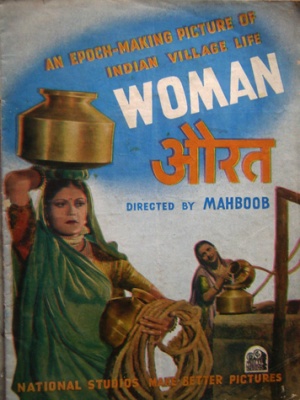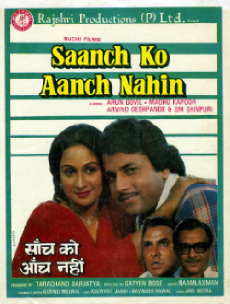
Aaj Ki Awaaz is a 1984 Indian Hindi-language vigilante action film directed by Ravi Chopra and produced by B. R. Chopra. The film stars Raj Babbar, Smita Patil, Nana Patekar, and Vijay Arora. The film's music is by Ravi. The film is based on 1982 Hollywood movie Death Wish II. It tells the story of a professor who becomes a vigilante after his sister is raped and his mother is killed. This film was remade in Telugu in 1985 as Nyayam Meere Cheppali, in Tamil in 1985 as Naan Sigappu Manithan and in Kannada in 2000 as Mahatma.

Avishkaar is a 1974 Indian Hindi-language film. Produced and directed by Basu Bhattacharya, the film stars Rajesh Khanna and Sharmila Tagore. The film was the part of Basu Battacharya's introspective trilogy on marital discord in an urban setting, which included Anubhav (1971) and Griha Pravesh (1979). Khanna had waived 70% of his remuneration to star in this project.

Aurat, also known by its English title Woman, is a 1940 Indian film directed by Mehboob Khan and starring Sardar Akhtar, Surendra, Yakub, Kanhaiyalal and Arun Kumar Ahuja. The film's music is by Anil Biswas and dialogue is by Wajahat Mirza. Mehboob Khan later remade this film as Mother India (1957), which is considered one of the biggest hits of all time in Indian Cinema.
Ek Adhuri Kahani is 1972 Hindi language movie directed by Mrinal Sen, starring Utpal Dutt, Shekhar Chatterjee, Vivek Chatterjee, Aarti Bhattacharya, Shyam and Shobha Sen. It was based on a Bengali story, Gotrantar by Subodh Ghosh.
Andhi Gali is a 1984 Hindi drama film directed and written by Buddhadev Dasgupta, and based on Bengali story, Ghar Bari by Dibyendu Palit. It stars Deepti Naval, Mahesh Bhatt and Kulbhushan Kharbanda. The Naxalite movement in Bengal in the 1970s forms a backdrop to the film.

Nitin Bose was an Indian film director, cinematographer and screenwriter of the nation's film industry. He was born in Calcutta and died in the same city. In the 1930s and early 40s, he worked with New Theatres, who made bilingual movies: in both Bengali and Hindi. Later, he moved to Bombay and directed under the banners of Bombay Talkies and Filmistan.
Dhoop Chhaon or Bhagya Chakra is a 1935 Hindi movie directed by Nitin Bose. It was a remake of the Bengali film Bhagya Chakra. Dhoop Chhaon was the first Hindi film to use playback singing. It was Bose who came up with the idea of playback singing. He discussed with music director Raichand Boral and Bose's brother Mukul Bose, who was the sound recordist in New Theatres, and who implemented the idea.

Husn Lal and Bhagat Ram were the first legendary music directors duo in Bollywood. They are two brothers, Husn Lal and Bhagat Ram.

Saanch Ko Aanch Nahin is a 1979 Bollywood drama film directed by Satyen Bose. This film was inspired by the story Panch Parmeshwar, written by the famous writer Premchand. The film was produced by Tarachand Barjatya. The film stars Arun Govil, Om Shivpuri and Urmila Bhatt, and also marked the debut of actress Madhu Kapoor.
Shodh is a 1979 Bollywood ghost movie directed by Biplab Roy Chowdhury and produced by Sitakant Misra, based on the Bengali book Gorom Bhat O Nichhok Bhooter Goppo by Sunil Gangopadhyay.
Tatineni Rama Rao was an Indian filmmaker. He directed 75 Hindi and Telugu feature films between 1966 and 2000.
The Sun's Seventh Horse is a 1952 Hindi meta fiction novel by Dharamvir Bharati, one of the pioneers of modern Hindi literature. The novel presents three related narratives about three women: Jamuna, Sati, and Lily. It is narrated by Manik Mulla, who is also a character in the novel, to his friends over seven afternoons, in the style of Hitopadesha or Panchatantra. The novel looks at the disappointments in love faced by these women and how they cope with their lives. The self-reflexive story is also known for its subversive take on the "Devdas" syndrome. The Sun's Seventh Horse was published after Bharati's debut novel Gunahon Ka Devta (1949), which subsequently became a classic.

Aaj Aur Kal is a 1947 Indian Hindustani film. The film is directed by Khwaja Ahmad Abbas.
Apne Paraye is a 1980 Indian Hindi-language drama film directed by Basu Chatterjee and produced by Mushir Alam. It stars Amol Palekar and Shabana Azmi in pivotal roles. It is based on the 1917 Bengali novel, Nishkriti by Sarat Chandra Chattopadhyay
Nazir Hussain was an Indian actor, director and screenwriter. He was famous as a character actor in Hindi cinema and was a pioneer of Bhojpuri cinema. He acted in almost 500 films, with Dev Anand starring in a large proportion of the films he acted in.

Jungle Ka Jawahar is a 1953 Hindi action adventure film directed by Homi Wadia and produced by Basant Pictures. The story was written by Boman Shroff and the special effects were by Babubhai Mistry. Having played daredevil roles starting in the 1930s, Fearless Nadia was still playing lead action roles in the 1950s and continued to act till 1968. The film starred Fearless Nadia, John Cawas, Leela Kumari, Shyam Sunder and Shapoor Aga.
Rajkamal Kalamandir was a noted film production company and studio in Mumbai. It was established by V. Shantaram in 1942, after he left Prabhat Films. The studio produced films both in Hindi and Marathi, and it was best known for Dr. Kotnis Ki Amar Kahani (1946), Amar Bhoopali (1951), Jhanak Jhanak Payal Baaje (1955), Do Aankhen Barah Haath (1957), Navrang (1959) and Pinjra (1972). In its heyday, Rajkamal was one of the most sophisticated studios of the country.
Jeevan Lata is a 1936 Hindi social drama film directed by Sarvottam Badami. The film was produced by Sagar Movietone and had music by Pransukh M. Nayak. Sabita Devi and Motilal paired in several films right from Motilal's first Shaher Ka Jadoo (1934), with Badami using the pair for many of the films he directed for Sagar Movietone. This was Motilal's fourth film. The film starred Sabita Devi, Motilal, Gulzar, Sankatha Prasad, Bhudo Advani and Mehdi Raza.

The Encyclopaedia of Hindi Cinema is a 2003 film encyclopedia and criticism book that was edited by Gulzar, Saibal Chatterjee, and Govind Nihalani, detailing the history of Bollywood from silent era to sound era. The book was contributed by the former two along with Allan Amin, Salim Arif, Shoma Chatterji, Susmita Dasgupta, Veeru Devgan, Bhaskar Ghose, Arun Kaul, Amir Ullah Khan, Amit Khanna, Lata Khubchandani, Akash Khurana, Amita Malik, Ramesh Meer, Suresh Naik, Anjum Rajabali, K. S. Ramesh, Maithili Rao, Firoze Rangoonwala, Sharmishta Roy, Ratnottama Sengupta, Bhawana Somaaya, Vijay Tendulkar, and Anil Zankar.:xv–xx

Smita Patil was an Indian film and theatre actress. Patil is regarded among the finest and greatest stage and film actresses in the history of Indian cinema. She appeared in over 80 films in several languages, but mostly in Hindi and Marathi, in a career that spanned just over a decade. Patil is a recipient of two National Film Awards, a Filmfare Award, two Filmfare Awards Marathi and received the Padma Shri, India's fourth-highest civilian honour in 1985.










